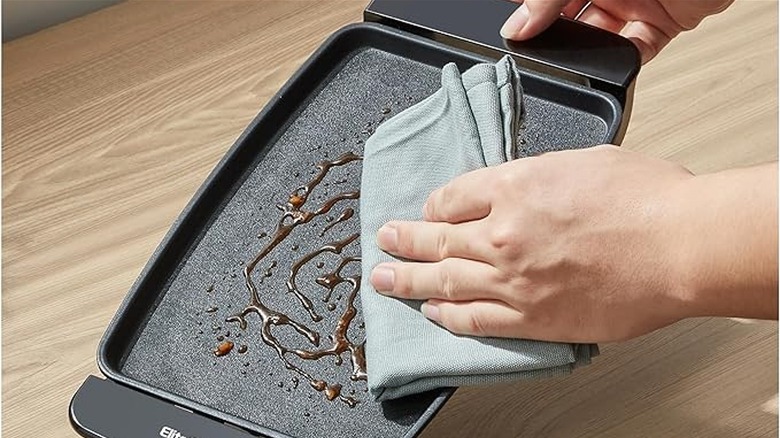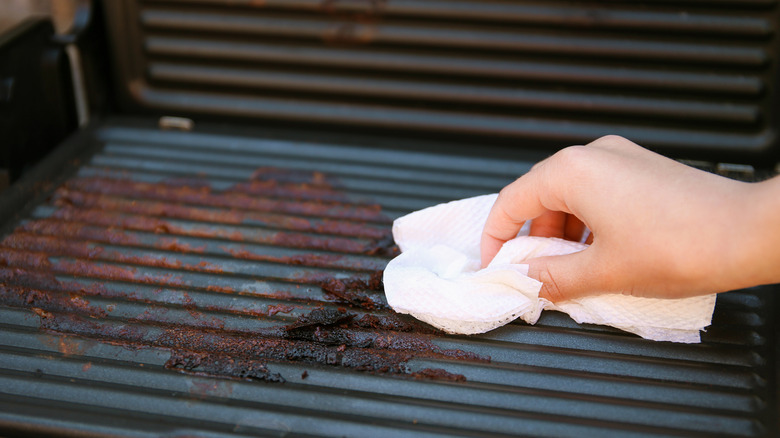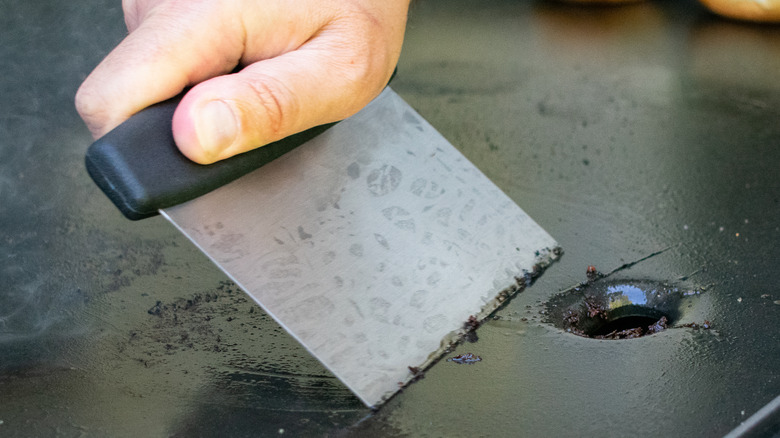The Key To Cleaning Your Electric Griddle Is Easier Than You Think
When your child has friends over for the night, it's a must to create a big, hearty breakfast for everyone the next morning. Preparing dozens of pancakes at a time means pulling out the electrical griddle you have tucked away just for these occasions. Electric griddles can be a versatile, easy-to-use cooking appliance — one that plugs in anywhere. The electric heating element is sure to make preparing pancakes easy.
However, there's a problem: how do you keep this surface clean? You can't just put it under the faucet to wash it off. Because it's electric, that could be both dangerous and damaging to the system. Some will have removable plates you can lift off and wash this way, but the average electric griddle is a much simpler, plug-and-play type of appliance that needs a little bit of care and attention.
The good news is that, even if you haven't cleaned the surface in some time, most electric griddles will wipe clean with the proper method. Of course, you should always check the owner's manual to make sure you're not using any chemicals, cleaning agents, or processes that are dangerous for the surface. As long as that checks out, one of the simplest ways to clean your electric griddle is simply to use heat to help you — and you can use this same trick to cleaning your waffle iron or other countertop appliances with a nonstick surface.
Why heat is the best way to clean an electric griddle
Once you've scrambled some eggs or made a bunch of pancakes, the best way to clean your electric griddle is simply to wipe it down right away. When you're cooking with an electric griddle, the heat allows very tiny openings to expand on the surface of the metal. Those microscopic areas allow food to enter deeper into the surface of the griddle, getting trapped. When the pan cools down, those food particles are harder to remove from those areas.
Because a chemical reaction occurs between the food and the metal of the griddle, it can lead to sticking, even if it's very limited. The sticking, which is very common with any type of protein-based product like eggs, occurs because of the chemical bond between the griddle's surface and the food itself. By properly cleaning this surface now, before it cools down and locks in that food particulate, you're able to remove most of the material more easily.
Right after you're done using it, unplug the griddle, but don't allow it to cool much. Run a spatula over the edge of the surface upside down to break that bond. You shouldn't do this if you have a nonstick surface since it can damage the protective material. You can also use a paper towel or a clean cloth to wipe down the surface, being very careful not to burn yourself. This should remove most of the particles present.
What if you pull it out to use and it's dirty?
Let's say the kids are still sleeping, and you pull the electric griddle out only to realize it wasn't cleaned properly before putting it away last time. Now what? You can certainly use a damp cloth to wipe off any debris from the surface, including food particles and dust. If the griddle has a removable plate, remove it and wash it with mild dish soap and a clean sponge. Warm, soapy water can be effective. If the surface is non-stick, though, make sure your cloth or sponge is not going to leave scratches.
An alternative option is to plug in the electric griddle and let the surface heat up. Then, pour a small amount of water onto the hot surface, creating steam. Use a clean cloth folded up and placed on the surface of the griddle, along with a spatula to maneuver it to clean the surface. The heat helps the metal to expand, allowing for better removal of caked-on materials. The steam will help to loosen all of the material on the surface, and thanks to the heat present, it also kills any germs. You can repeat this process several times by allowing the grill surface to heat and then adding a few more tablespoons of water to it.
Be careful! Steam can burn. Afterward, also note that you don't want to put grates into the dishwasher, whether they are grill or electric griddle grates: this could cause damage to the surface.


